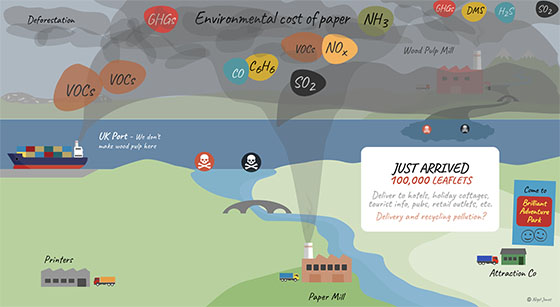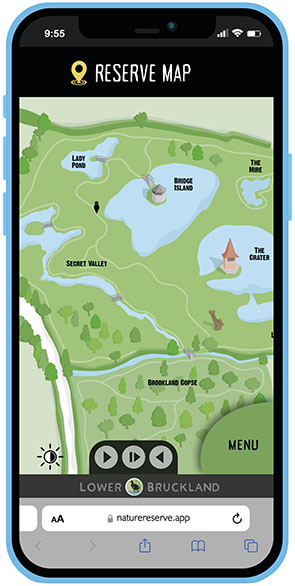The elephant in the room
This post is greater than 6 months old - links may be broken or out of date. Proceed with caution!

By Nigel Jones, Project Leader

Have you really considered the environmental cost of those paper leaflets for your visitor site?
I suppose when you take a close look at paper, it’s usually clean and white, and on the face of it wouldn’t strike you as polluting, but it really is. There’s no two ways about it, paper has a horrible environmental footprint, from the chopping down of trees, and all the energy associated with this activity, pulping of wood (more waste including dioxins), then shipping of the pulp to paper mills where paper is made (again extremely environmentally damaging), and then the shipping out of paper to printers, who then process and produce printed materials, using more energy, chemicals and producing waste yet again before the final product is completed and ready for delivery (and yet more transport energy - I also forgot to mention the acidification of river catchment areas due to conifer forests that provide the wood constituent, and also I suppose later on the environmental cost of recycling).

So, how do we provide information to the public without paper you may ask? Well the essential truth is that pretty much everyone today carries their mobile phone on them, and most now have the latest large screen smartphones which are amazing devices and are essential built for information delivery. However, you’re probably aware that people are less inclined to ‘read’ these days and the nature of delivery has to be more visual because of shorter attention spans. The truth is that even the larger 6” smartphone screens are quite small compared to an A4 sheet of paper, so it does require quite a lot more work to make information usable on mobile screens. App Studio UX are a company that spend a lot of their time developing interface strategies for information delivery on mobile. Nigel Jones their proprietor says that universal support of html 5 within internet browser software has really been a game changer. He also said: ‘we seem to spend a lot of our time making maps work on mobile - so that A4 paper map leaflet, how do you translate that on to mobile and make it usable? The secret is through interactivity and animation - an area in which we specialise. So for instance, one of our clients (Lower Bruckland Farm Nature Reserve in Devon) wanted to totally remove paper leaflets from their site, the original paper A4 leaflet was essentially a nature reserve site map which the client said got picked-up, then binned upon the visitor leaving. Not only was this environmentally unsustainable, but carried the burden of bin emptying maintenance and also the cost of reordering leaflets periodically, which was ongoing.
Now they have a Map App - visitors arrive, scan the QR code on their phone camera and the web app opens instantly in their smartphone’s browser - it’s that easy. When the visitor leaves, they can either delete the browser tab, or save the web app to their mobile’s home screen for future reference. And there are no privacy issues because unlike an Apple or Android app, it doesn’t need to be installed, nor require passwords or sensitive info such as your social media login. The map is also great fun and engaging because of the animation and control buttons. See this Map App for Lower Bruckland Nature Reserve app here.
Another of our special maps is the Tap-Map, if you click the link here, you can see how you can get 40 nature reserves all accessible on a single mobile phone screen.
Nigel Jones said that ‘people do assume that proprietory mapping such as Google Maps, Apple Maps, etc., will do the job, but the reality is that for extra detail and functionality you have to get your hands dirty. We digitally illustrate maps from scratch, then add functionality as required, it’s probably the only way for the instances shown above.’
If you have any questions, Nigel Jones can be reached on 07940 804005 or info@appstudioux.com
More from App Studio UX